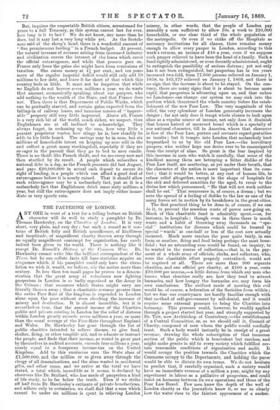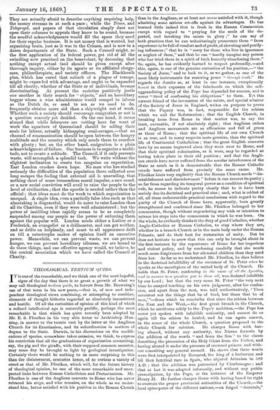THE PAUPERISM OF LONDON. THE PAUPERISM OF LONDON.
ANY ONE in want of a text for a telling lecture on British character will do well to study a pamphlet by Dr. Thomas Hawkesley, on the Charities of London. It is very short, very plain, and very dry ; but such a record as it contains of British folly and British munificence, of kindliness and ineptitude, of magnificent charity thrown away through an equally magnificent contempt for organization, has rarely indeed been given to the world. There is nothing like it except Dr. Russell's Histou of the Crimean War. Dr. Hawkesley cannot write like the brilliant correspondent of the Times, but he can collate facts till bare statistics acquire an eloquence which, if his pamphlet could only have the circulation we wish it, would, we believe, stir the nation more than oratory. In less than ten small pages he proves to a demonstration that the great army of volunteers now fighting pauperism in London is as badly organized as the Army in the Crimea ; that resources which States might envy are literally thrown away ; that a charitable revenue greater than the entire Poor Rate of the kingdom is expended in London alone upon the poor without even checking the increase of misery and destitution. It is almost incredible, but it is nevertheless true, that the annual income of the Charities public and private existing in London for the relief of distress within London greatly exceeds seven millions a year, or more than the usual average of the Poor-Rate throughout England and Wales. Dr. Hawkesley has gone through the list of public charities intended to relieve disease, to give food, shelter, firing, or other tangible aid, and to educate or instruct the people, and finds that their income, as stated in great part by themselves in audited accounts, exceeds four millions a year, nearly equal to a fourpenny income-tax on the United Kingdom. Add to this enormous sum the State alms of .£1,500,000, and the million or so given away through the clergy of all denominations, and the alms wasted in accidental gifts, and other sums, and we arrive at the total we have stated, a total which, incredible as it seems, is declared by observers like Dr. Stallard, who has made of pauperism a kind of life study, to be far below the truth. Even if we strike off half from Dr. Hawkesley's estimate of private benefactions, and adhere only to certainties, we shall find that a sum which cannot be under six millions is spent in relieving London misery, in other words, that the people of London pay annually a sum sufficient to allow 10s. a week to 230,000 households, or one clear third of the whole population of the metropolis. Or even if we strike off the Hospitals as necessary institutions for all classes, there remains money enough to allow every pauper in London, according to this week's returns, an income of £40 a year, even if we suppose each pauper relieved to have been the head of a family. Such a fund rightly administered, or even decently administered, ought to extinguish the possibility of serious distress ; yet not only has it not been extinguished, but pauperism has in ten years increased two-fold, from 77,660 persons relieved on January 1, 1858, to 163,179 relieved on January 1, 1868, and there is no sign that the increase is about to be stayed. On the contrary, there are many signs that it is about to become more rapid, that pauperism is advancing upon us, and that unless we Londoners can change our system we may sink into the position which threatened the whole country before the establishment of the new Poor Law. The very magnitude of the relief, the very splendour of London generosity increases the danger ; for not only does it tempt whole classes to look-upon alms as a regular source of income, not only does it diminish that honest hatred of unearned bread which is a specialty of our national character, till in America, where that character is free of the Poor Law, porters and servants regard gratuities as insults ; but it tempts into London that melancholy host bequeathed to us by the old Poor Law,—the hereditary paupers, who neither hope nor desire ever to be emancipated from the receipt of alms. So great is the fear inspired by this increase in men who watch it carefully, that some of the kindliest among them are betraying a bitter dislike of the Poor Law itself, are muttering, as yet under their breath, that the character of the nation is more important than its comfort ; that it would be better, at any cost of human life, to refuse relief altogether, except in the shape of hospitals for the sick and deferred annuities for the aged, to recur to the divine law which pronounced, "He that will not work neither shall he eat." That recurrence is, of course, a dream ; but we note the spread of a feeling of dislike to the law as one of the many forces set in motion by its breakdown in the great cities.
The first practical thing to be done is, of course, if we can do it, to prevent the senseless waste of power now going on. Much of this charitable fund is admirably spent,—as, for instance, in hospitals ; though even in them there is much waste, and a habit of throwing away thousands on " special " institutions for diseases which could be treated in special "wards" at one-half or less of the cost now actually incurred. Much more reaches the poor quite fairly, in one form or another, firing and food being perhaps the most beneficial; but an astounding sum would be found, on inquiry, to be wasted in the course of collection,—that is, in the payment of a whole army of officials, clerks, and collectors, who, were the charitable effort properly centralized, would not be required at all. There are more than 900 separate charities, and one official per charity, at £100 a year, costs £90,000 per annum,—a little datum from which any man who knows what charities really are, how they tend to attract barnacles, and how hungry the barnacles are, may form his own conclusions. The swiftest mode of meeting this evil would be, of course, a federation of the Societies from within ; but we fear our countrymen are hardly familiar enough with that method of self-government by self-denial, and it would require some external pressure to bring the Charities into harmony. This pressure could, however, be readily applied through a project started last year, and strongly supported by Dr. Tait, now Archbishop of Canterbury,--the establishment of a Central Committee, or, as we should call it, Council of Charity, composed of men whom the public would cordially trust. Such a body would instantly be in receipt of a great revenue, drawing the whole subscription of that immense section of the public which is benevolent but careless, and might make grants in aid to every society which fulfilled certain reasonable conditions of organization and audit. It would occupy the position towards the Charities which the COMMIS occupy to the Departments, and holding the purse would be able to dictate its own terms. We do not hesitate to predict that, if carefully organized, such a society would have an immediate revenue of a million a year, might try any experiment in labour as a palliative of pauperism, and could insist on harmony between its own operations and those of the Poor Law Board. Few men know the depth of the well of London charity as the journalists know it, or see so clearly how the water rises to the faintest appearance of a sucker. They are actually afraid to describe anything requiring help, the money streams in at such a pace ; while the Times, and Telegraph, and papers of that circulation simply dare not open their columns to appeals they know to be sound, because the needful acknowledgments would fill the space they need for their regular business. It is not money that is wanted, but organizing brain, just as it was in the Crimea, and is now in a dozen departments of the State. Such a Council might, as the first application of its federal power, get rid of all the swindling now practised on the benevolent, by decreeing that nothing except actual food should be given except after thorough inquiry, either by its agents or its affiliated clergymen, philanthropists, and society officers. The Blackheath plan, which has cured that suburb of a plague of tramps, might be expanded with advantage, and ought to be expanded till all charity, whether of the State or of individuals, became discriminating. At present the societies positively jostle one another in their search for "objects," and an hereditary beggar whom a wise administrator would compel to labour as the Dutch do, or send to sea as we used to do, frequently obtains more aid than a shipwright out of work. Whether such a society should encourage emigration or not is a question scarcely yet decided. On the one hand, it seems absurd that while labourers are rotting here for want of work the squatters of Queensland should be selling their souls for labour, actually kidnapping semi-savages,—that no channel of communication should be open between the hungry multitude and the country which only needs them to overflow with plenty ; but, on the other hand, emigration is a plain acknowledgment of failure. Our business is to organize a multitude, not to create a solitude. The Council, if it only prevents waste, will accomplish a splendid task. We write without the slightest inclination to create too sanguine an expectation. East London crushes down hope. No man who has studied seriously the difficulties of the population there collected ever long escapes the feeling that external aid is unavailing, that nothing short of some tremendous moral impulse, a new creed, or a new social conviction will avail to raise the people to the level of civilization ; that the apostle is needed rather than the official ; that ideas must do the work to which organization is unequal. A single idea, even a partially false idea such as that almstaking is disgraceful, would do more to raise London than all its Charities, even if they were well administered ; but the power of instilling ideas rapidly seems to be as completely suspended among our people as the power of enforcing them against the popular will. London needs either a Luther or a Frederick, an evangelist or a drillmaster, and can get neither, and so drifts on helplessly, and must to all appearance drift on till a catastrophe makes of opinion itself an executive power. Meanwhile, we can prevent waste, we can prevent hunger, we can prevent hereditary idleness, we are bound to do these things, and one effective agency would, we believe, be the central association which we have called the Council of Charity.































 Previous page
Previous page